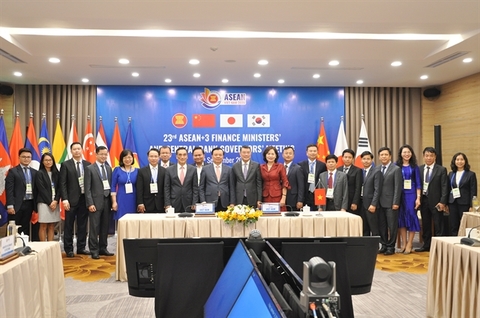
The 23rd ASEAN+3 Finance Ministers' and Central Bank Governors' Meeting (AFMGM+3) was attended by the Finance Ministers and Central Bank Governors of China, Japan, South Korea and the 10-member Association of South East Asian Nations (ASEAN). — Photo the courtesy of the organiser
Regional and financial co-operation are crucial to strengthen the co-ordination and respond to the impacts of the COVID-19 pandemic and support a sustained economic recovery, participants agreed at a meeting held Friday in Ha Noi.
The 23rd ASEAN+3 Finance Ministers' and Central Bank Governors' Meeting (AFMGM+3) was attended by the Finance Ministers and Central Bank Governors of China, Japan, South Korea and the 10-member Association of South East Asian Nations (ASEAN).
It is considered as an important milestone in the ASEAN+3 financial co-operation progress under the co-chairmanship of Viet Nam and Japan in 2020.
The event was also attended by ASEAN Secretary General, President of the Asian Development Bank (ADB), Director of Regional Office for Asia and the Pacific, International Monetary Fund (IMF) and Director of ASEAN+3 Macroeconomic Research Office (AMRO).
Viet Nam’s Finance Minister Dinh Tien Dung and Governor of the State Bank of Viet Nam Le Minh Hung co-chaired the meeting with Deputy Prime Minister and Minister of Finance of Japan Aso Taro and Governor of the Bank of Japan Kuroda Haruhiko.
During his opening remarks, the Minister of Finance said the COVID-19 pandemic was causing a heavy impact on the global and regional economy.
“According to the IMF's forecast, the global economic growth in 2020 will decline by 4.9 per cent, while the Asian region's economy will decrease by 1.6 per cent. The economies in the region are facing enormous challenges,” Dung said.
The ASEAN Finance Ministers and Central Bank Governors and counterparts from China, South Korea and Japan, and representatives from international organisations discussed global and regional macro-economic policies and other policy measures in response to COVID-19 pandemic.
They discussed policy solutions that regional economies have been implementing to restore economic growth, including fiscal, monetary and other financial regulatory policies.
The Ministers and Governors acknowledged that increasing economic interdependence among countries had triggered detrimental effects of the pandemic on the global supply chain. These impacts require financial and monetary management agencies to develop and adopt effective macroeconomic policies to enhance their economic resilience, thereby maintaining the stability and integrity of their financial systems.
The Ministers and Governors also reviewed ASEAN+3 financial co-operation initiatives, and adopted Joint Statement of the 23rd ASEAN+3 Finance Ministers' and Central Bank Governors' Meeting.
Technical documents were also approved, including amending the Chiang Mai Initiative Multilateralisation (CMIM) Agreement on the increase in the IMF De-Linked Portion from 30 per cent to 40 per cent and CMIM operational guidelines, including CMIM Swap Implementation Manual, the CMIM Conditionality Framework for the IMF Linked Portion and IMF De-linked Portion, and plans on 11th Test Run of CMIM.
The amendments have helped to increase the availability and efficiency of CMIM operations, and meet new requirements of the financial market, thereby making CMIM an effective tool to supplement a regional and global financial safety net. Achievements in CMIM Initiative have important implications for tightening cooperation and strengthening mutual support when regional economies have confronted many difficulties and uncertainties.
The meeting appreciated the efforts of the ASEAN+3 Macroeconomic Research Office (AMRO) as an international organisation actively implementing macroeconomic surveillance activities, providing its assessment and analysis on the impact of the COVID-19 pandemic on regional economies, and policy recommendations to secure regional macroeconomic and financial stability.
In order to enhance regional economic and financial stability, the Finance Ministers and the Central Bank Governors welcomed the implementation of new initiatives under Strategic Directions of ASEAN+3 Finance Process.
These initiatives comprise of promoting local currency usage for trade and investment payments, as well as payment connectivity; developing a comprehensive initiative on infrastructure finance; designing supporting tools to help members better solve problems of macroeconomic structure; harmonising collaborative climate change financing initiatives such as the Southeast Asia Disaster Risk Insurance Facility (SEADRIF) and enhancing policy coordination to harness the benefit of technological advancements while minimising financial risks.
Bond market initiative
At the meeting, the Finance Ministers and the Central Bank Governors also appreciated the implementation progress and achievement of Asian Bond Markets Initiative (ABMI) working groups which provide insight on how to improve the investment environment, develop new investment tools, improve legal frameworks, develop infrastructure for the bond market, and provide technical assistance programmes on bond market development.
The ABMI continued to foster the development of local currency bond markets to mitigate currency and maturity mismatches and to mobilise the region’s savings to finance long-term investment across the region, they said.
The Credit Guarantee and Investment Facility (CGIF) had supported infrastructure financing, including the Infrastructure Investors Partnership (IIP) study. CGIF should utilise the findings from the study to explore innovative ways to further promote regional infrastructure financing and local currency bond market development.
They urged a commencement of a new technical assistance (TA) project to promote local currency green bonds to meet the region’s infrastructure needs as well as the commencement of a new TA project aimed at improving the usefulness of AsianBondsOnline (ABO). — VNS